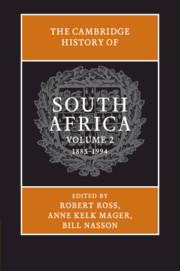Book contents
- Frontmatter
- Contents
- Contributors
- Acknowledgments
- Note on references
- Introduction
- 1 South Africa and South Africans: Nationality, Belonging, Citizenship
- 2 Imperialism, Settler Identities, and Colonial Capitalism: The Hundred-Year Origins of the 1899 South African War
- 3 Class, Culture, and Consciousness in South Africa, 1880–1899
- 4 War and Union, 1899–1910
- 5 South Africa: The Union Years, 1910–1948 – Political and Economic Foundations
- 6 South African Society and Culture, 1910–1948
- 7 The Apartheid Project, 1948–1970
- 8 Popular Responses to Apartheid: 1948–c. 1975
- 9 Resistance and Reform, 1973–1994
- 10 The Evolution of the South African Population in the Twentieth Century
- 11 The Economy and Poverty in the Twentieth Century
- 12 Modernity, Culture, and Nation
- 13 Environment, Heritage, Resistance, and Health: Newer Historiographical Directions
- Statistical Appendix
- Bibliography
- Index
- References
3 - Class, Culture, and Consciousness in South Africa, 1880–1899
Published online by Cambridge University Press: 28 July 2011
- Frontmatter
- Contents
- Contributors
- Acknowledgments
- Note on references
- Introduction
- 1 South Africa and South Africans: Nationality, Belonging, Citizenship
- 2 Imperialism, Settler Identities, and Colonial Capitalism: The Hundred-Year Origins of the 1899 South African War
- 3 Class, Culture, and Consciousness in South Africa, 1880–1899
- 4 War and Union, 1899–1910
- 5 South Africa: The Union Years, 1910–1948 – Political and Economic Foundations
- 6 South African Society and Culture, 1910–1948
- 7 The Apartheid Project, 1948–1970
- 8 Popular Responses to Apartheid: 1948–c. 1975
- 9 Resistance and Reform, 1973–1994
- 10 The Evolution of the South African Population in the Twentieth Century
- 11 The Economy and Poverty in the Twentieth Century
- 12 Modernity, Culture, and Nation
- 13 Environment, Heritage, Resistance, and Health: Newer Historiographical Directions
- Statistical Appendix
- Bibliography
- Index
- References
Summary
The mineral discoveries that launched its industrial revolution between the late 1860s and the end of the 1890s were crucial in the shaping of modern South Africa and the peculiarities of its social order. Within that period, the years between 1880 and 1899 were both violent and formative. Framed by wars of conquest at their beginning and by the outbreak of the South African War of 1899–1902 at their end, at the heart of those years lay the mineral discoveries of the 1860s–1880s, first diamonds in Griqualand West in 1868 and then alluvial gold in the eastern Transvaal in the early 1870s, followed by gold on the Witwatersrand in 1886. All over southern Africa, mining led to a dramatic increase in economic activity and to renewed imperial intervention in its affairs. For the first time, the region received large flows of immigrants and capital investment from abroad. New towns, railways, roads and harbours were built, and new urban markets opened up for locally produced food and manufactured goods. The earlier movement of African migrants in search of work in colonial labour markets was greatly accelerated. And as the demand for African land and labour spiralled, conflict was heightened as white farmers tightened their grip on rent and labour tenants on their land and encroached on African lands beyond the colonial and republican borders.
- Type
- Chapter
- Information
- The Cambridge History of South Africa , pp. 102 - 156Publisher: Cambridge University PressPrint publication year: 2011
References
- 2
- Cited by



